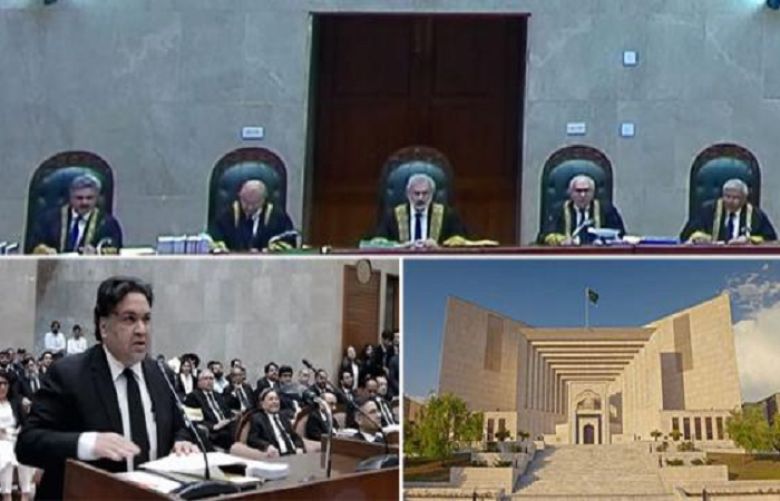Chief Justice of Pakistan (CJP) Qazi Faez Isa said Tuesday that all issues would have been resolved had the Pakistan Tehreek-e-Insaf (PTI) held intra-party polls.
The remarks came as a full court 13-member bench conducted a hearing on the Sunni Ittehad Council's petition, which is an ally of the PTI, against the denial of reserved (women and minorities) seats.
The bench, headed by CJP Isa, comprises Justices Syed Mansoor Ali Shah, Munib Akhtar, Yahya Afridi, Aminuddin Khan, Jamal Khan Mandokhail, Muhammad Ali Mazhar, Ayesha Malik, Athar Minallah, Syed Hasan Azhar Rizvi, Shahid Waheed, Irfan Saadat Khan and Naeem Akhtar Afghan.
The PTI had joined hands with the SIC ahead of the February 8 elections to contest the polls after the Election Commission of Pakistan (ECP) stripped the party of its electoral symbol, a decision upheld by the top court.
However, this did not help the party as the election commission did not allocate reserved seats to the SIC, citing its failure to submit its list of candidates.
The party had then approached the Peshawar High Court (PHC) on the said issue wherein the court upheld the electoral body's decision.
In April, SIC chief Sahibzada Hamid Raza, along with the Khyber Pakhtunkhwa Assembly speaker, moved the SC seeking setting aside of the PHC verdict and the allocation of 67 women and 11 minority seats in the assemblies.
On May 6, a three-member SC bench headed by Justice Mansoor Ali Shah, including Justice Muhammad Ali Mazhar and Justice Athar Minallah, suspended the PHC verdict.
It then referred the matter to the judges' committee for the formation of a larger bench since the matter required constitutional interpretation.
Today's hearing
During the hearing today, SIC's lawyer Advocate Faisal Siddiqui argued that although the SIC didn't contest the elections as a party, independent candidates did in fact participate in the polls.
The counsel further stressed that the SIC did submit the list of its candidates but the ECP rejected it, saying that the party didn't contest the polls.
CJP Isa highlighted that SIC had shown itself as a parliamentary political party on two occasions and a political party on one.
In response, Advocate Siddiqui contended that a political party can in fact be a parliamentary political party.
"The Constitution differentiates between a parliamentary political party and a political party," the chief justice noted.
'We were a political party before the February 8 elections and became a parliamentary political party after [winning] independent candidates joined us," the SIC lawyer replied stressing that the Constitution doesn't provisions the words "parliamentary party" other than Article 63A.
In response to the SIC lawyer's argument that there wouldn't have been any problem if the apex court had explained its verdict on the bat symbol, the chief justice said that the issue of reserved seats would simply not exist if the PTI had conducted its intra-party polls.
"Don't blame everything on the SC," he stressed.
"The PTI deprived its people of democratic rights [...] had the elections been held they would've benefited PTI members themselves.
"If you want to talk about democracy, then follow it to the letter," the top judge remarked.
"Start from the beginning, don't talk about the ECP and the establishment," he added.
Meanwhile, Justice Akhtar, while recalling that the independent candidates had shown themselves as affiliated with the PTI and that their nomination papers were duly accepted and they even won the polls, remarked that a candidate who portrays himself as belonging to a party will be considered to be affiliated with it.
Only those will be considered as independent candidates who submit an affidavit that he is not affiliated with any political party, he said.
"How can the ECP's law could declare PTI's candidates as independents," Justice Akhtar noted.
In response to Justice Akhtar's remarks that the controversy arose after a political party was deprived of its electoral symbol, the chief justice questioned why the PTI didn't challenge the court's orders in this regard.
"Why did you not ask for the bat as an independent candidate," the CJP asked Advocate Siddiqui.
"All independent candidates cannot ask for bat," the counsel replied, stressing that Salman Akram Raja had even requested the ECP to be declared as a PTI candidate. However, he added, Raja's request was dismissed.
"There's a different form for each constituency, why can't you ask for it,' the judge stressed.
He said that the party should've declared its candidates as independent and should've then sought the bat symbol.
"You should've at least tried to secure the bat symbol. The SC would then would have seen whether it was to be allotted to you or not," the CJP said.
The court then adjourned the hearing till June 24.







